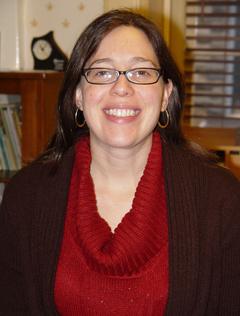Carla R. Fisher, Ph.D.
 Term: Fall 2011
Term: Fall 2011
Contact: carlarenee22@yahoo.com
Topic:
While at Grey Towers Carla was revising the dissertation (“You’re Not Getting Rid of Me: Cultivating Space for Women in the U.S. Forest Service, 1950-1990.”) to submit it to an academic press for publication. Her dissertation examines the experiences of women and minority workers in the United States Forest Service and focuses on the entrance of women and minority specialists and professionals after the 1960s. She argues that women’s acceptance into the workforce was complicated by the informal workplace structure that did not change despite the modifications of official policies and actions to fulfill civil rights legislation and court orders. In other words, while civil rights legislation and court cases were important in pushing public institutions, like the Forest Service, to open the workforce to women and minority workers, these were not sufficient in creating.
While women have always worked for the Forest Service it was not until the 1970s and 1980s that they were hired in substantial numbers to fill positions outside of the clerical classification. The entrance of female professionals coincided with the increase in the number of non-forester and non-engineer specialists within the agency, which complicated the changes in the workforce and created a hostile environment for many new women workers. Understanding the experiences of the first women biologists, soil scientists, landscape architects who also became fire fighters, district rangers, and forest supervisors, is essential to the history of the Forest Service and the way it has broadened its mission in the past forty. The scholarship on women (and minorities) in the Forest Service is limited. There are a handful of articles, some official Forest Service publications, compilations of oral histories, and one sociological study by Elaine Enarson that was published in the early 1980s. Many of the articles focus on women as wives of rangers or as fire lookouts, or on the few women who were hired into professional positions before the 1960s.
The Forest Service and supporting institutions have taken steps to record the stories of men and women who have worked for the agency and there are wonderful oral history compilations at the University of California, the Smithsonian, and various regional offices. However, there has been no substantial study of women’s contributions and experiences in the Forest Service in the late twentieth century and this project helps correct that oversight.
The dissertation consists of an introduction and five chapters arranged chronologically that cover the entrance of women and minority professionals and the Gene Bernardi lawsuit that led to the Region Five consent decree. In order to prepare a publishable manuscript I will rewrite the introduction and separate the material on the consent decree into a single chapter. This will add one more chapter and allow more expansive discussion in chapters three and four of the experiences of women and men outside of Region Five.
Testimonial:
“My time at Grey Towers was exactly what I needed. I finished my dissertation a year earlier and I was studiously ignoring it. The environment at Grey Towers, especially a tower room office, many friendly people who were very interested in my project, the peace and quiet of a small town surrounded by nature, motivated me. I was able to reevaluate my project, get a lot of the initial editing finished and make a plan for completing the project.”
Publication:
You’re not getting rid of me: Cultivating space for women in the U.S. Forest Service, 1950-1990
Article:
Published 10/28/19 (journal article per Research Gate https://www.researchgate.net/scientific-contributions/2027348417_Carla_R_Fisher, but may be her dissertation from Purdue instead https://docs.lib.purdue.edu/dissertations/AAI3449744/)
